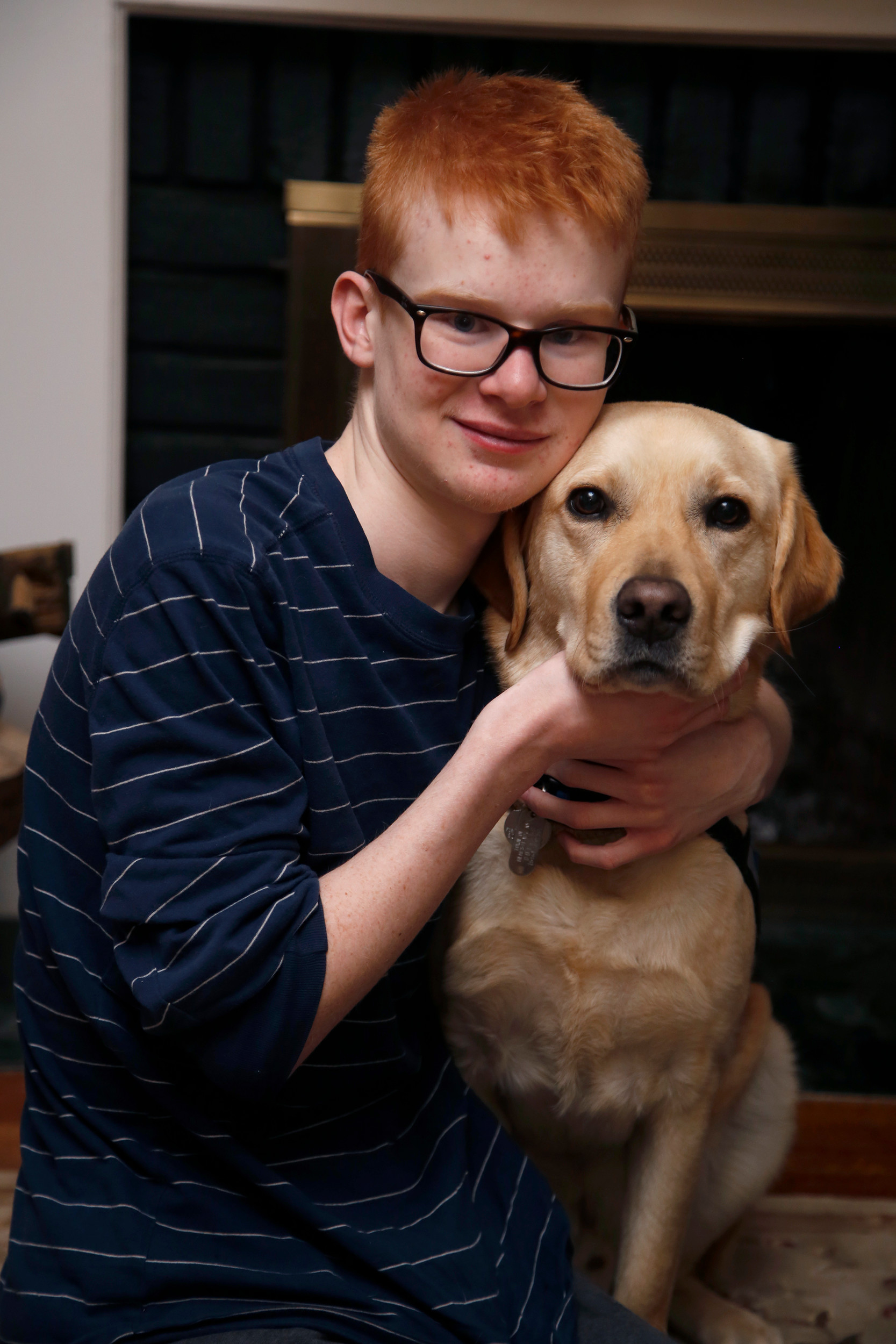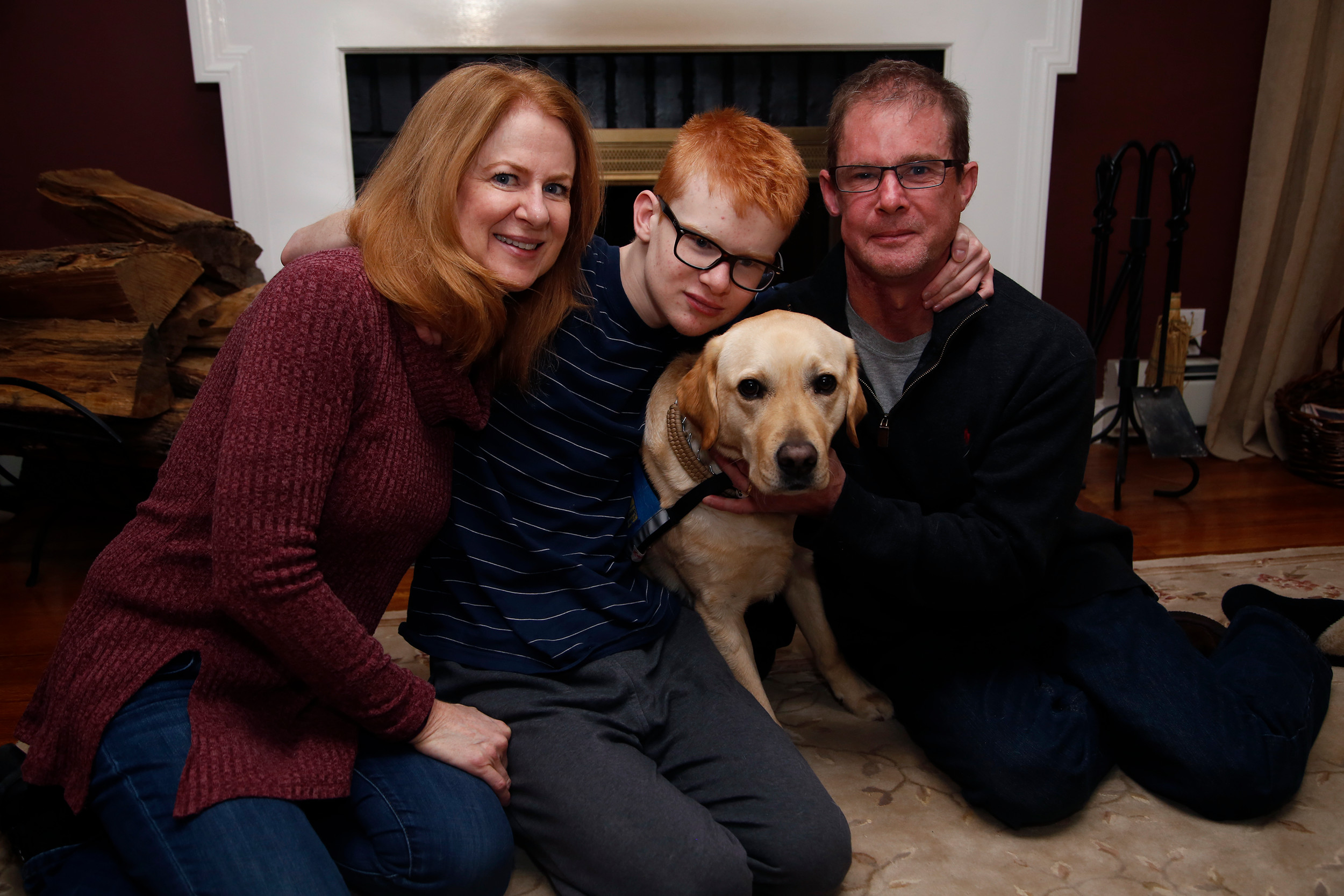A Malverne boy and his service dog
Discovering Canine Companions for Independence to help kids on the autism spectrum
Any dog owner can attest to the companionship and happiness a pet can add to a life. But the benefits for Malvernite Terence McKenna, 14, have been life-changing, his family says.
Terence, a ninth-grade Gersh Academy student who is on the autism spectrum, and his family were matched last October with Nubert, a highly trained assistance dog provided to them at no cost by the national non-profit Canine Companions for Independence, which trains service dogs for those with a variety of special needs, including Terence’s.
The difference Nubert has made in Terence’s life, his family said, has been nothing short of incredible. “The fact that Terrence is even interacting with the dog right now, let alone sitting there answering your questions, is an amazing difference,” said his father, John McKenna, adding that his son was usually buried in his iPad, distant from the world around him. “Now he’s drawn out of that because he loves Nubert.”
CCI, which was formed in 1975, is headquartered in Santa Rosa, Calif., and has a regional office in Medford. It trains service dogs for people with physical disabilities; hearing dogs for the deaf or hard of hearing; facility dogs that work with special-needs adults; and companion dogs for children and adults with physical, cognitive and developmental disabilities.
“He picks me up when I’m bored by chasing me around,” Terence said of Nubert, a golden retriever-Labrador mix, “and at various times I chase him too. He makes it easier by cuddling me.”
The McKenna family learned about CCI unexpectedly, after John retired from his job as a special agent for the Bureau of Alcohol, Tobacco, Firearms and Explosives in 2015. “These two guys,” John said, referring to Terence and his brother, Thomas, “every night for a long time, they said, ‘We should get a dog. We should get a dog.’ I was working at the time, and I’d say, ‘Absolutely not.’”
After he retired, John began searching for a dog, and called to mind the bomb-sniffing dogs that were trained by the ATF. That led him to research dogs with different training that might be a good fit for Terence. “I stumbled across the CCI,” he recounted, “and I said, Holy mackerel, this is awesome.”
John sent an application to CCI’s Medford office and waited. A year later, he and Terence were called in for an interview, and then took part in a two-week training program, taking classes and spending hours with several dogs to determine which would be the best fit for Terence. “It’s a very big commitment to go to the training for two weeks,” John said, “but there were people there from Vermont, Massachusetts, Pennsylvania and Virginia.”
The CCI trainers eventually chose Nubert for the McKennas. At a graduation ceremony, a class of 13 dogs and their leashes were turned over to Terence and 12 others.
CCI officials said that they have a network of roughly 1,200 volunteer puppy “raisers” across the country, who train the dogs. Many are golden retrievers or Labs, or a mix of the two. Two of the local trainers are Fred and Kathleen Dietrich, who worked with Nubert in their Stony Brook home. The Dietrichs attend regular puppy-training classes provided by CCI and other organizations, and have raised and trained a half-dozen dogs over the past 10 years.
“One dog we trained, Woody, has gone to someone that was in a motorcycle accident in Pennsylvania,” Fred said. “He’s wheelchair-bound. Another dog, Fernando, went to a woman in Springfield, Mass., who is wheelchair-bound. He pulls her around in the wheelchair, and she said, for the first time, she is able to walk her children to school because of Fernando.”
Over 18 months of training, the dogs learn more than 40 commands, from the basic “sit” to opening doors, picking up items dropped on the floor and listening for the telltale noises of an emergency.
“We’re very happy with how all of this turned out,” said Eileen McKenna, Terence’s mother. “Terence would have a hard time being in a place that he didn’t like, because he didn’t understand it or it would be boring to him. One of those situations is when Thomas runs cross-country, and the family sometimes waits for hours to watch him compete. “Now we bring Nubert, and Terence is occupied,” she said. “He sits on the floor with him, interacts with him, and all the girls come over and sit with them.”









